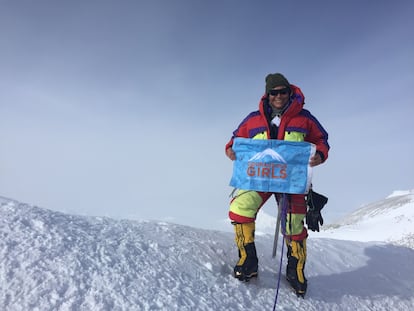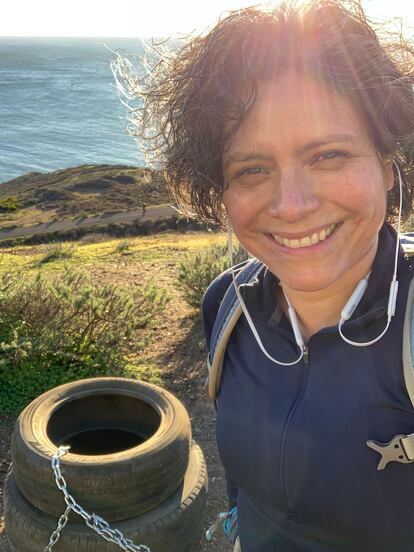From Silicon Valley to Mount Everest: A journey of personal salvation aided by ayahuasca
Silvia Vasquez-Lavado, a former executive at eBay and Paypal, has published a memoir explaining how she went from shunning nature walks to climbing the world’s Seven Summits

“Like a lot of other people, I used to think ‘what’s the point of going on a nature walk? What am I going to gain from doing that?’” says Silvia Vásquez-Lavado, who was born in 1974 in Lima, the capital of Peru.
And yet just a few years later, she began training for what might be described as the ultimate nature walk: climbing Mount Everest. Weighed down by 100-pound (45 kg) backpacks, she would drag several tires tied together with a chain up and down the hills outside San Francisco, where she lives. “That’s how I trained. By carrying weights I was doing the equivalent of climbing at high altitude, because you add pressure and you have to breathe,” she explains in a video conference from her home.
What caused the change in attitude? It was an ayahuasca session in her native Peru shortly before starting a job as an eBay executive in 2005. The session took place before dawn with her parents, for whom this was not the first time using the psychoactive brew. As she lay there, she saw, without opening her eyes, “a rainbow drowning, a messy watercolor puddle of purples and reds and greens and oranges,” as she writes in her newly published book In the Shadow of the Mountain: A Memoir of Courage. Vásquez-Lavado is also the executive producer of a movie that will star Selena Gómez.

The brew uncovered concealed memories of herself as a little girl and the abuse she was subjected to for years by a domestic worker. “For those of us who have gone through trauma, it cuts off parts of you,” she explains. “That part of me that I wanted to forget was the most essential part. It was like the Lego piece I needed to reconnect with myself.”
Her inner child wanted to be taken to a place where “her body could expand and move and feel all the things she’d been too scared to pay attention to,” she writes in her book. And that place was Mount Everest, the Mother of the World.
Vásquez-Lavado began her journey climbing the so-called Seven Summits, the highest mountains on each continent, leaving Everest for the end. She is reportedly the first gay woman to do so, and the first Peruvian woman as well. “When they told me that, my reaction was ‘come on, hasn’t there been a more hardcore lesbian than me who’s climbed the mountain before, a predecessor?” she exclaims.
The book contains a lot of personal stories, but it essentially talks about climbing and connecting with nature and how “the mountain can save us.” In 2016 she made the trip to Everest base camp in the company of a group of American and Nepalese youths who were also abused as children. It was part of the work that she does as head of an organization called Courageous Girls.
The book is also the story of a woman newly arrived in the US from her native Peru who seeks to find her place in turn-of-the-millenium San Francisco, a “wild west” where she became addicted to work, alcohol and sex by her own account. The following are some of the main episodes in the book.
1. Beverly Hills 90210
When Vásquez-Lavado left Peru to study at a US university, she thought it would look like the popular TV show Beverly Hills 90210, but instead she ended up “in Amish country, in Pennsylvania.” She had always liked math and computer science, but her father did not approve. She studied to be an accountant, got her degree, discovered her sexuality, saw a gay parade in San Francisco and decided to move there. It was 1997, during the dotcom bubble, and she began working for a company called Skyy Vodka after sending 200 resumes and fearing she would have to return to Peru if nobody hired her.
2. Salvation in Excel
When she joined Skyy her boss asked her to read an Excel manual. It was a revelation and the beginning of a career spent implementing financial systems in Silicon Valley. This knowledge of spreadsheets also applied to the private sphere. One of the key moments in the book is a crisis involving difficulties to reach Everest base camp with a group of young women. Vásquez-Lavado explains how she went to her computer, opened up Excel and began re-planning the journey, factoring in delays and worst-case scenarios. There is something oddly soothing in the act of putting things in boxes, deleting them, moving them around, she says. In 2005 she joined eBay, which involved global business trips, and she began climbing mountains. By then she had climbed the corporate ladder as far as it would take her in the tech world.
3. A walking slogan
She describes herself as a “walking slogan” on Mount Everest, a woman who was lesbian, vegetarian and gluten-intolerant among macho climbers. The first meal with the expedition at base camp makes for an extraordinary scene: a lone woman who has climbed there by herself, surrounded by men busy boasting about their own achievements. One of the climbers at the dinner table, Tom, was a former Navy Seal who once ran two Iron Mans in one day. Vásquez-Lavado remembers how she felt increasingly small as she realized she was surrounded by James Bond or Mission Impossible types. She walked out and went to her tent to cry.
But then something incredible happened. Most of those superheroes never made it to the top – there were injuries, episodes of altitude sickness. “Rules don’t apply here,” she writes. “Ego and brute force [...] guarantee little around here.” She had thought of the mountains as a level playing field because being gay or female or Peruvian did not matter here – everyone is at the mercy of the same elements. Yet even here, she saw a Japanese woman being harassed by a sherpa, and heard an expedition leader say that it wasn’t such an unusual event, not even here at the foot of the tallest mountain in the world. Vásquez-Lavado compares her own climbing achievements to her work breaking glass ceilings in the corporate world, and says she hopes that stories like her own will help other women find the power that lies within themselves.
4. Summit tourism
Vásquez Lavado paid over €40,000 ($43,700) to climb Everest. She recalls how tough it was, making their way from one camp to the next, then going back down to get used to the altitude. And good weather was required for the final stretch. That’s where the lines of climbers started to form. In her book, Vásquez-Lavado recounts her prowess simply, as though these were things one does every other day. She also discusses the fear of death during a particularly atrocious storm.
Here again, the writer sees parallels with her career in Silicon Valley. “On the professional side, we all have a dream, a goal, we’re behind something, but we don’t know what. At least on Mount Everest, the dream is very clear: we want to reach the top. You can’t have an attitude of ‘I hope you turn around to let me through.’ Respect is knowing our place and understanding what kind of job we need to do to keep our dream alive.”
Tu suscripción se está usando en otro dispositivo
¿Quieres añadir otro usuario a tu suscripción?
Si continúas leyendo en este dispositivo, no se podrá leer en el otro.
FlechaTu suscripción se está usando en otro dispositivo y solo puedes acceder a EL PAÍS desde un dispositivo a la vez.
Si quieres compartir tu cuenta, cambia tu suscripción a la modalidad Premium, así podrás añadir otro usuario. Cada uno accederá con su propia cuenta de email, lo que os permitirá personalizar vuestra experiencia en EL PAÍS.
¿Tienes una suscripción de empresa? Accede aquí para contratar más cuentas.
En el caso de no saber quién está usando tu cuenta, te recomendamos cambiar tu contraseña aquí.
Si decides continuar compartiendo tu cuenta, este mensaje se mostrará en tu dispositivo y en el de la otra persona que está usando tu cuenta de forma indefinida, afectando a tu experiencia de lectura. Puedes consultar aquí los términos y condiciones de la suscripción digital.









































